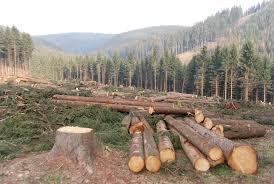Deforestation is the purposeful clearing of forested land. Throughout history and into modern times, forests have been razed to make space for agriculture and animal grazing, and to obtain wood for fuel, manufacturing, and construction. Deforestation has greatly altered landscapes around the world.Deforestation is the purposeful clearing of forested land. Throughout history and into modern times, forests have been razed to make space for agriculture and animal grazing, and to obtain wood for fuel, manufacturing, and construction. Deforestation has greatly altered landscapes around the world.Deforestation has greatly altered landscapes around the world. About 2,000 years ago, 80 percent of Western Europe was forested; today the figure is 34 percent. In North America, about half of the forests in the eastern part of the continent were cut down from the 1600s to the 1870s for timber and agriculture. China has lost great expanses of its forests over the past 4,000 years and now just over 20 percent of it is forested. Much of Earth’s farmland was once forests.
Today, the greatest amount of deforestation is occurring in tropical rainforests, aided by extensive road construction into regions that were once almost inaccessible. Building or upgrading roads into forests makes them more accessible for exploitation. Slash-and-burn agriculture is a big contributor to deforestation in the tropics. With this agricultural method, farmers burn large swaths of forest, allowing the ash to fertilize the land for crops. The land is only fertile for a few years, however, after which the farmers move on to repeat the process elsewhere. Tropical forests are also cleared to make way for logging, cattle ranching, and oil palm and rubber tree plantations.Deforestation can result in more carbon dioxide being released into the atmosphere. That is because trees take in carbon dioxide from the air for photosynthesis, and carbon is locked chemically in their wood. When trees are burned, this carbon returns to the atmosphere as carbon dioxide. With fewer trees around to take in the carbon dioxide, this greenhouse gas accumulates in the atmosphere and accelerates global warming.
15 Practical Ways to Stop Deforestation
You can contribute to the efforts against deforestation by doing these easy steps:
1. Plant More Trees
Engage in tree-planting initiatives in your community or through global organizations.
2. Go Paperless
Reduce paper consumption by going digital at home and in the office. When you do need to print, use both sides of the paper.
3. Support Responsible Companies
Choose to support companies that are committed to reducing deforestation and use sustainable practices.
4. Buy Certified Wood Products
Opt for wood or paper products that are certified by the Forest Stewardship Council (FSC) or similar organizations.
5. Buy and Use Responsibly
Consider your purchases carefully. Buy only what you need, and prioritize items with less packaging or reusable containers.
6. Avoid Palm Oil
Palm oil production contributes significantly to deforestation. Check labels and avoid products containing palm oil where possible.
7. Recycle and Buy Recycled Products
Support the recycling economy by buying recycled products and recycling them again after use.
8. Educate Others
Raise awareness about deforestation in your social circle and community. The more people know, the more they can help.
9. Support Sustainable Agriculture
Buy from local farmers who practice sustainable agriculture, helping to reduce the demand for deforested land.
10. Advocate for Forest Protection Policies
Support policies and politicians that prioritize forest conservation and responsible land use.
11. Support Indigenous Rights
Support Indigenous communities who often are excellent stewards of the forests they inhabit.
12. Offset Your Carbon Footprint
Consider supporting carbon offset programs that protect existing forests or plant new trees.
13. Reduce Meat Consumption
Livestock farming is a major cause of deforestation. Consider reducing your meat intake or choose products from sustainable farms.
14. Use Renewable Energy
Using renewable energy reduces the need for deforestation caused by mining and drilling.
15. Volunteer or Donate
Consider donating your time or money to organizations that work to prevent deforestation.
Remember, every action counts. By making informed choices, we can contribute to preserving our forests and securing the future of our planet. And remember… every product that is made out of trees is Recyclable. So practice recycling diligently.
Thank You

